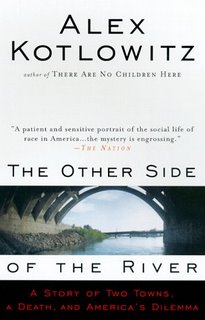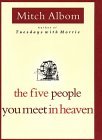Friday, June 30, 2006
Thursday, June 29, 2006
52 Books, Week 20: The Other Side of the River
 I should let my homegirl from Benton Harbor write this one. Very interesting story about the history of two towns in Michigan that have a deep history of racism.
I should let my homegirl from Benton Harbor write this one. Very interesting story about the history of two towns in Michigan that have a deep history of racism.Everything bubbles to the surface when a young black man is found dead, under very very mysterious cirucmstances. I wish I could say it was a story of redemption or tolerance, but it ends up just being an unfortunate commentary on how insidious racism is.
"A black teenager surfaces in the St. Joseph River, drowned. How did he get there? The towns of Benton Harbor and St. Joseph, divided by both race and the river, grapple with the possibilities in this maddeningly difficult case. Alex Kotlowitz puts his sharp reporting skills to good work here, describing in detail everything that is known about Eric McGinnis's short life and untimely death. But the book is best at plumbing the racial psychology of these mutually suspicious communities"
Not my words, but a good synopsis. Not bad, but if you like clean plot lines, this wouldn't be my first recommendation.
Labels: 52 Books
Wednesday, June 28, 2006
Quote of 2006 (Thus Far)
"Atlanta, even with all of the ownership drama going on right now, needs someone at the one more than Sprite needs a new ad campaign."
I think, sometimes, that the current Sprite ad campaign may be the worst I have ever seen. Ever.
Monday, June 26, 2006
Personal gods
Q&A with Bill Simmons by SI's Chris Ballard. Can't believe I didn't post this before. It's funny that an article about Simmons may be the only thing that could be longer than an article by Simmons. (This online component is an extension of an article Ballard wrote in the 3-27-06 issue of Sports Illustrated concerning, "How the Web is changing sports coverage.")
Monday, June 19, 2006
In Recognition of Juneteenth
"The blues is an art of ambiguity, an assertion of the irrepressibly human over all circumstances, whether created by others or by one's own human failing."
"When I discover who I am, I'll be free."
And hey, while we're here...two of my favorite James Baldwin quotes:
"Americans, unhappily, have the most remarkable ability to alchemize all bitter truths into an innocuous but piquant confection and to transform their moral contradictions, or public discussion of such contradictions, into a proud decoration, such as are given for heroism on the battle field."
- I think I like this quote more for his vernacular snappation than for what it says. You know how I am prone to verbosity and sesquipedalians.
"It is very nearly impossible... to become an educated person in a country so distrustful of the independent mind."
- Yessssssir...Speak on it.
In case you have no idea what Juneteenth is - and suprisingly, I've recently discovered a number of unfamiliar folks - check this out. (Ralph Ellison also penned a novel of the name, Juneteenth, which after given a heads up of the novel's "circumstances," I have not made a priority to read.)
Sunday, June 18, 2006
Airplane Food
 Since I was waiting on a Smash TV game (XBOX 360), I thought I would bang out a quick post about one of my favorite subjects - Airplane Food.
Since I was waiting on a Smash TV game (XBOX 360), I thought I would bang out a quick post about one of my favorite subjects - Airplane Food.I know people tend to make lots of jokes about how horrible airplane food is, but since I travel so much, I get to try some every now and then. Headed out to San Francisco last week I had a very pleasurable culinary experience, which I must say, shocked your boy a little bit. Granted, it was probably because I was starving, but that rubbery chicken and those wilted veggies tasted like heaven to me. Top it off with a glass of white wine, and you would have sworn I was..
Then, then! Once you thought it was over, add some coffee with some bailey's, and a slice of chocolate cake.. Game Over. Those excrutiating 4.5 hours in the air only felt like a mind-numbing 3:45.
Friday, June 16, 2006
Generalist' Reading List
Book 46: Fiasco
Book 45: Steppenwolf
Book 44: Bringing Down the House
Book 43: The Dark Tower IV
Book 42: I Am Legend
Book 41: Tales of a New America
Book 40: Storm Front
Book 39: The Company
Book 38: Culture and Prosperity
Book 37: What We Believe But Cannot Prove
Book 36: Me Write Book
Book 35: Sevin Sins of Memory
Book 34: In Praise of Slowness
Book 33: The Bell Jar
Book 32: The Covenant
Book 31: Bridges of San Luis Rey
Book 30: Contact
Book 29: The End of Work
Book 28: Winning the Future
Book 27: 1984
Book 26: The Socipath Next Door
Book 25: The Stranger
Book 24: The Horizontal Society
Book 23: Watership Down
Book 22: Urban Tribes
Book 21: Foundation
Book 20: The Other Side
Book 19: The Five People You Meet In Heaven
Book 18: Class Matters
Book 17: Never Let Me Go
Book 16: Against All Enemies
Book 15: Go Tell It On The Mountain
Book 14: Blink
Book 13: Choke
Book 12: Assata
Book 11: How We Are Hungry
Book 10: Is Bill Cosby Right
Book 9: No Longer At Ease
Book 8: We Who are Dark
Book 7: The Corner
Book 6: Snobbery
Book 5: Falconer
Book 4: Guns, Germs, and Steel
Book 3: The Corrections
Book 2: 102 Minutes
Book 1: Cannery Row
Sunday, June 11, 2006
52 Books, Week 19: The 5 People You Meet in Heaven
 Pretty sappy book about recognizing the value of life, etc. etc. A lot of people would probably look down their nose at this one. Not terribly novel (no pun intended), but I ate it up.
Pretty sappy book about recognizing the value of life, etc. etc. A lot of people would probably look down their nose at this one. Not terribly novel (no pun intended), but I ate it up.Speaking of eating. Other things i realize I would like to do in a city: 1) order good chinese food (i'd like to get indian food to0, but that might be doing too much); 2) Eat at a IHOP every now and then; 3) Got to a lounge (underground mind you) and listen to jazz.
Labels: 52 Books
Saturday, June 10, 2006
damn
 I have become so disastified with hip-hop/rap that I feel like I have no choice to demote it as my primary music genre of choice. Maybe alternative or indie folk... other suggestions? Since I can't even think of 5 rap albums I 'm going to buy this year, it may be time to move on... Great times we've had hip-hop... great times...
I have become so disastified with hip-hop/rap that I feel like I have no choice to demote it as my primary music genre of choice. Maybe alternative or indie folk... other suggestions? Since I can't even think of 5 rap albums I 'm going to buy this year, it may be time to move on... Great times we've had hip-hop... great times...Random stat of the day... From the most current issue of Foreign Policy magazine:
In 2002, with troops in Afghanistan, 85 % of 18-to-24 year old Americans suveryed cound not find either country on a map. 69% couldn't find Britain, and 29 % couldn't find the Pacific Ocean. Even more staggering is that nearly a third of folks believed the US Population to be between 1 and 2 billion.
Tuesday, June 06, 2006
06-06-06 Playlist
Charlie Daniels Band - The Devil Went Down To Georgia
- Shouts to my pre-freshman year roommate for putting me on to this song. We used to "vibe" to this joint. Hope my mans is doing well, straight up.
D'Angelo - Devil's Pie
- Never was a big D'Angelo fan by any means, especially because in "Nothing Even Matters" he says "tendacy" (4th verse 2nd line, folks) - that's up there with "tooken" in Lucy Pearl's "Dance Tonight" (courtesy of Dawn Robinson) and ANYBODY who pronounces laptop as laBtop, including you Cam'ron, especially when you want to draw it alllll out in your rhyme - ...but this song gave us the line "Ain't no justice...just us / ashes to ashes, dust to dust" and gave rise to many more like it.
Lee "Scratch" Perry - Chase The Devil
- Aside from being a song I mess with as is, this gave us the incredible sample used in - here comes another...
Jay-Z - Lucifer (I have 5 versions of this by the way)
- ...and you can't like the sequel without paying some homage (even if we are talking about devils and what not) to the original.
Jeru the Damaja - Ain't The Devil Happy
- I feel like it's always a good idea to show ole Jeru some love whenever appropriate given that The Generalist mused that Jeru may be the Most Slept On Emcee. "Written on these pages is the ageless / Wisdom of the sages, ignorance is contagious / So I hope you keep your focus / There's no hocus-pocus, in the end, it's just us"
I would have thrown D-12's "Devils Night" album on here but I couldn't in good faith because I have one song from the album and its the clean version of "Purple Pills" - "Purple Hills." I also guess that Three 6 Mafia's "I Gotta Stay Fly" could have made it; I mean they did win an Oscar.
Monday, June 05, 2006
Aristocrates' Reading
? Books, Book 5: The Shadow of the Wind
? Books, Book 4: Freedom Dreams
? Books, Book 3: The Tipping Point
? Books, Book 2: 102 Minutes
? Books, Book 1: Busting Vegas
Book Club: The Emperor of Ocean Park
Hopefully, this becomes a list of some length...hopefully.
Sunday, June 04, 2006
? Books, Book 4: Freedom Dreams
 "All who have accomplished great things have had a great aim, have fixed their gaze on a goal which was high, one which sometimes seemed impossible." "All men who have achieved great things have been great dreamers." - Orison Swett Marden
"All who have accomplished great things have had a great aim, have fixed their gaze on a goal which was high, one which sometimes seemed impossible." "All men who have achieved great things have been great dreamers." - Orison Swett MardenI've taken a long time to review this book because I wasn't sure what I wanted to say. That hasn't changed and this likely won't be my best...but here goes:
"I have come to realize that once we strip radical social movements down to their bare essence and understand the collective desires of people in motion, freedom and love lay at the very heart of the matter," writes Robin D.G. Kelley in Freedom Dreams: The Black Radical Imagination. Kelley then sets out a survey of black radical movements ranging from Back to Africa, communist and Marxist allignment, Third World consciousness, black feminism, and connections to surrealism. While Kelley elucidates how the Cuban Revolution and, even stronger, Mao's Cultural Revolution spurred the dreams of newborn radical organizations like the Black Panther Party and the little-known Revolutional Action Movement (RAM), he cautions that, "I don't pretend to have written anything approaching a movement history or an intellectual history, and I am not interested in explaining why these dreams of revolution have not succeeded (yet!)."
Kelley's caveat proves personally problematic at times because it eats at just how imagination, vision, and everyday political work co-exist and interact. Many of these radical movements to which Kelley devotes a significant amount of pages (e.g. RAM) were ultimately unsuccesful in creating the world of freedom as they had imagined. Should we simply ignore the unmet goals and intra-organizational problems of these movements and appreciate the spirit of their motives? Admittedly, it gets increasingly difficult to "imagine" with Kelley when, after pages of dedication, he himself admits, "We know with hindsight that millions of people were jailed, beaten and killed in the name of the Cultural Revolution; inside China itself, it hardly constituted a bright moment in socialist history."
The last chapter, which seemed to be well-received by some, on Surrealism as a state of mind centered around the work of both Aimé and Suzanne Césaire probably should get a re-read. I think I was exhausted by the survey of radical movements which becomes increasingly harder to read when: 1. there are lists and lists of names and organizations 2. movement after movement with some receiving significant more focus than others 3. I went from being familiar to not to familiar again and not knowing whether that knowledge was important to remainder of the reading. By the time I moved on to this chapter, I wasn't as involved as before. That being said, I did enjoy the survey as I feel motivated to do further readings on those particular movements which piqued my interest and it served as a google-earth timeline of radical movements.
I read this book because I usually shy away from action-oriented books grounded in ideas like imagination, dreaming, and vision. If the exercise of such faculties in the poli-social realm move you, I'm confident the book is worth at least the short read. Other than the survey, I probably didn't take much from it.
